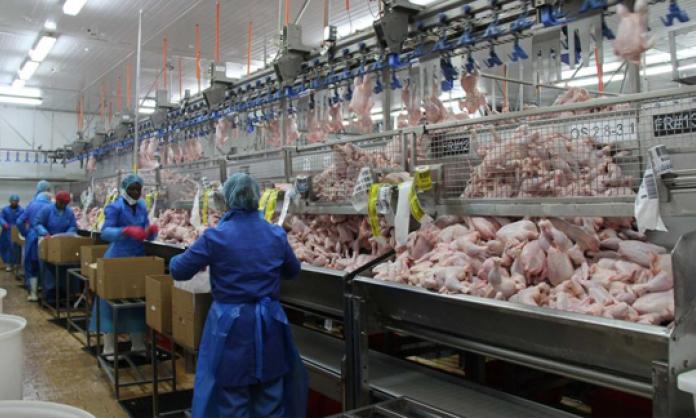“It’s a very bad agreement and we’ve gone backwards”, said Chris (not his real name), a National Union of Workers delegate at Hazeldene’s chicken factory near Bendigo. After the expiry of the enterprise agreement in October, management won a new agreement that will worsen conditions for workers at the plant.
Around 200 of Hazeldene’s 550-strong production workforce are migrant workers on 457, 417, student and spousal visas. The last time Red Flag spoke to Chris, he explained that these workers are paid below the minimum wage and have few rights and no job security. The union had hoped to improve their conditions as part of the most recent enterprise agreement campaign.
Instead, Chris said, the company has used the new agreement to undermine the position of the 350 process workers who do have permanent jobs.
The agreement expands the scope of individual flexibility agreements (IFAs) to most areas of employment. Hours of work, overtime rates, shift loadings and penalty rates can now be varied by an IFA signed by an individual worker and the company, which is one of the largest employers in the region.
Hazeldene’s has also succeeded in having fixed term contracts put into the agreement. “Now the company can put employees on these altered agreements and just continually renew their contracts until they don’t want them any more”, he said.
The company also wants to review the classifications of all workers, and may alter their classifications and pay rates. “There is a chance that they could use the changed classifications to sack people and make them re-apply for the same positions”, Chris said.
Hazeldene’s secured its rotten deal with the intimidatory tactics needed to get it over the line at the ballot stage, according to Chris. At one point, the company called the police on a worker trying to hand out “vote no” leaflets in the car park. It also handpicked the representatives from the floor that it would negotiate with and unilaterally terminated automatic payroll deductions for union dues in the middle of bargaining.
“It was planned from the beginning. We were getting ready to survey our members, and then the company pulled automatic deductions. They then held the first negotiation meetings two days later while we were running around signing everyone up to direct debit.”
The day before the vote, management told the workers that if they didn’t vote “yes”, there would not be another vote until after Christmas, threatening the workers’ back pay if they didn’t vote for the deal.
“People that work for Hazeldene’s live in poverty”, says Chris. “They really needed the money. The wages have gone up by a small amount but the conditions have gone backwards. We are just not going to have any security at all.”
However, Chris stresses that the union delegates at Hazeldene’s are focused on organising for the next fight. They’ve cohered a dozen new activists out of the campaign and plan to meet off site to debrief and plan for the future.
“We’re going to go back to old-school organising”, he said. “We don’t have strong numbers, we don’t have a strong agreement, and we’re definitely not protected by the law, so we need to make strong groups of workers and organise. Ironically, the company helped us identify those people, and now they can help us organise everyone else.”










